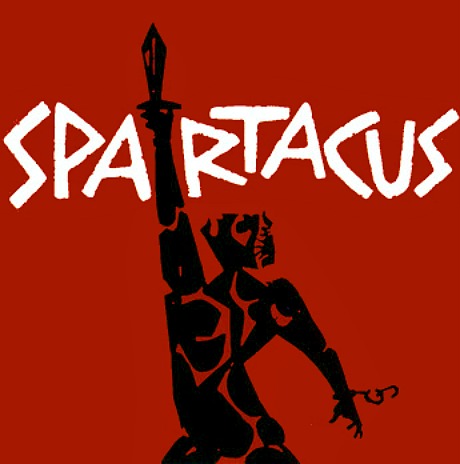

Tommie Smith and John Carlos during the medal ceremony at the 1968 Summer Olympics in Mexico City’s Olympic Stadium.
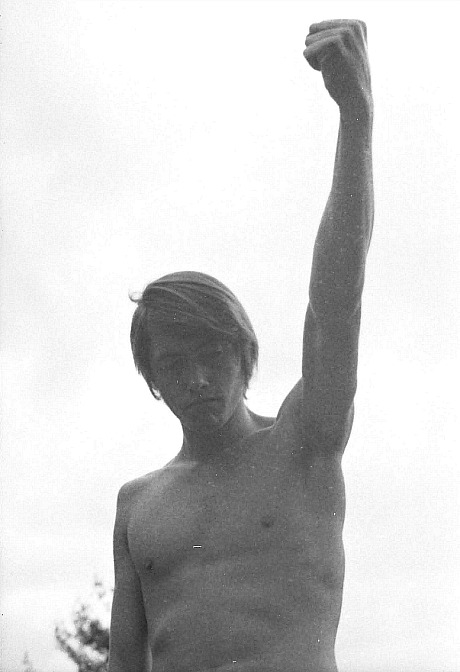



I had this attitude about Tom Hiddleston being a kind of wired, ginger-haired, string-bean guy who played chilly weirdos (Loki in The Avengers, the rigid-mannered captain in War Horse, Rachel Weisz‘s creepy lover in The Deep Blue Sea). Then out of nowhere he suddenly seemed to become this randy hot guy that women were talking about, second only to Benedict Cumberbatch. The affair with Elizabeth Olsen during the shooting of I Saw The Light, the talk about possibly becoming the new James Bond, playing an intense social climber in High Rise, his starring role in AMC’s The Night Manager. And how he’s putting it to Taylor Swift, which is cool. In my eyes he’s the most surprisingly transformed actor of the decade.
For years I’ve been derided for being a Steven Spielberg disser, for saying he’s been a super-hack since the late ’90s, for intensely regretting his love of Janusz Kaminski‘s milky-white cinematography, for recently loathing most of The BFG, for feeling annoyed by much of Catch Me If You Can, for hating his decision in Lincoln to depict the House of Representatives as having a large window with sunlight streaming through, for wearing sneakers to a Harvard graduation ceremony. And for my repeated declaration that his rep rests upon a 13-year hot streak between Duel (’71) and Indiana Jones and The Temple of Doom (’84), and that he rebounded in ’89 with Indiana Jones and the Last Crusade but then crashed with the labored Hook but then rebounded again with Jurassic Park, Schindler’s List, Minority Report and Saving Private Ryan, but that he’s been more or less on a lumpy downward swirl ever since.
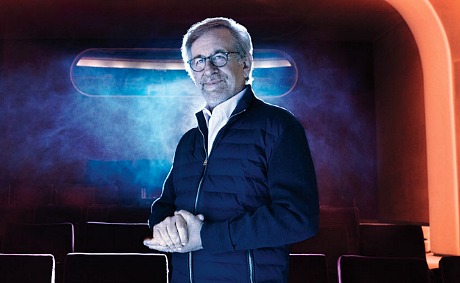
I am definitely a guy with a psychological problem for daring to say this stuff, right? I’m an asshole with an attitude, and every day Spielberg gets up, prepares himself a bowl of granola and yogurt with a cup of hot tea and then retires to his palatial bathroom and shits out little gold bars.
The kowtowing instinct toward Spielberg is so ingrained in this town that the following observation in a Kim Masters Hollywood Reporter profile is almost regarded as startling: “For years, everyone has wanted all of Steven Spielberg and taken what they could get. Spending limited time with him, I get the impression that he lives in a kind of bubble — protected by the privilege that comes with money, by aggressive partners, by loyal underlings and by the deference accorded to the most successful filmmaker in Hollywood history.” My God, she actually dared to say that insulation may be a slight factor in his creative determinations! Will THR send flowers and warm muffins to Spielberg’s office as a conciliatory gesture?
When Ken Loach‘s I, Daniel Blake won the Cannes Film Festival’s Palme d’Or, I posted the following: “WHAT? Wrong call, gents. A good film, but not my idea of a really good one, and a long way from greatness. It’s a sturdy, downish Loach-wheelhouse thing about an older craftsman (Dave Johns) with a heart condition getting the humiliating run-around by the system. Except it’s also about an obstinate fellow who’s more committed to venting frustration than playing the system for his own benefit. It’s a sad tale but the world is full of guys like this.”
On 5.13 I had an argument with a critic friend about Blake, and I posted it later that day:
Me: “You need to calm down on I, Daniel Blake. He’s a carpenter, a joiner, a delicate craftsman, and a would-be employer offers him a job around the two-thirds mark and he turns it down because he’d rather just keep pretending to look for work so he can keep getting government checks?
“Don’t tell me it’s because he’s afraid that working will give him a heart attack because he’s already leading a life of considerable stress plus the anguish of feeling depressed. When he said ‘no, thanks’ to that job, I checked out. No sympathy. If his heart is going to fail anyway then it’s better that it fail while he’s working and earning a living with a sense of pride than to die a miserable government dependent.
Bill Clinton was on fire when he addressed the 2012 Democratic Convention. His voice was strong and commanding, he seemed full of energy, his words inspired. And yes, he delivered a very touching speech at Muhammad Ali‘s memorial last week in Lexington. But it seemed as if he’d aged ten years since 2012. His voice sounded watery and feeble. He seemed to radiate half the energy. He’s not that old. It’s worrisome. Maybe he was just having a bad day. I love Bill ten times more than I like Hillary.
I’ve never read a James Stewart biography (are there any good ones?) but I’ve read a lot about him and I delivered some files (i.e., quotes and stories based on phone interviews) to People after he died in July 1997. And I think it’s safe to say that in the 1930s he was quite the ladies’ man. I’m mentioning this because I suspect that a reason why he enjoyed telling this joke was because of his randy past. I’ve never read that Stewart was anything but 100% loyal to Gloria, his wife of 45 years, but you have to know a little something about catting around and the pure animal joy of erections in order to tell a joke about catting around.
I never buy raw animal meat at the supermarket. The only time I did was when I was married. I’ll order a nice steak at a restaurant maybe twice a year, but with mixed emotions. I’ve never killed an animal for food. Okay, I once yanked a chicken’s head off with my bare hands but that was to prove a point, and I don’t feel good about having done that. I’ll eat prepared meat dishes at parties and sample meat from the buffet room at press junkets, but otherwise I steer clear. I’m more or less a vegetarian who often eats shrimp.
John Papola‘s At The Fork is a food doc. I’ve been invited to a meet-and-greet screening at Neuhouse in midtown Manhattan on the evening of Monday, 6.26. At The Fork will apparently begin screening sometime in July. Papola has partnered with Tugg, a theatrical event platform.
I’m not the world’s most knowledgable guy when it comes to Jerry Lewis‘s never-seen The Day The Clown Cried (’72), but to my knowledge an assembly of scenes from the finished film has never been shown to anyone. I’ve read all the articles, I’ve read the script, I’ve seen that BBC documentary that popped last January, and I’d love to view it when the embargo is lifted nine years hence (i.e., in 2025). But I’ve never watched actual scenes.
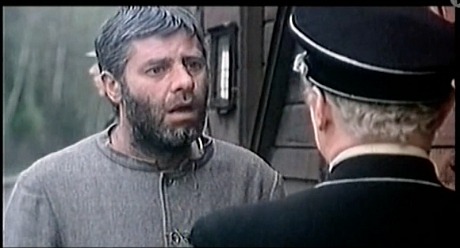
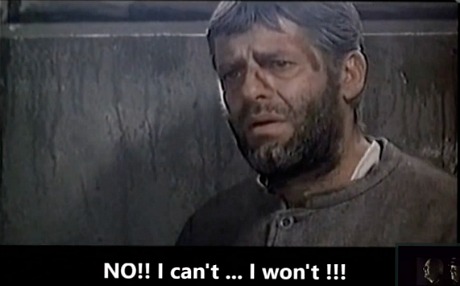
This morning a friend passed along a 31-minute Vimeo file (posted two months ago but yanked on Thursday morning…sorry) that provides the first real taste of Clown, or at least the first I’ve ever sat through. It’s basically a compressed, German-dubbed version of Lewis’s film that’s intercut with acted-out portions of the script by a troupe of 70somethings. It’s taken from Eric Friedler‘s 2016 documentary called Der Clown.
And you know what? I don’t see what’s so godawful about it. Yes, the scheme is manipulative bordering on the grotesque — Lewis as a German-Jewish clown in a Nazi concentration camp who’s ordered in the final act to amuse a group of children being sent to the “showers” — but that elephant aside it didn’t strike me as all that arduous or offensive. Lewis’s performance seems more or less restrained as far as the writing allows, and the story unfolds in a series of steps that seem reasonably logical. The supporting perfs and period milieu seem decent enough.
When everyone finally sees The Day The Clown Cried in 2025 the verdict may be that it’s a mediocre, miscalculated effort (or not), but I didn’t smell a catastrophe as I watched this whatever-you-want-to-call-it. Plus it costars HE’s own Harriet Andersson.
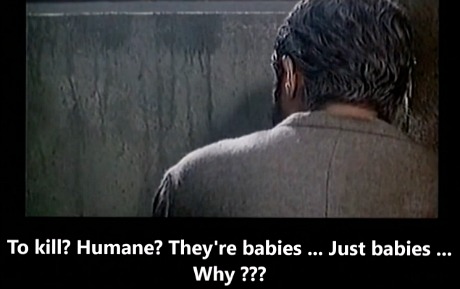
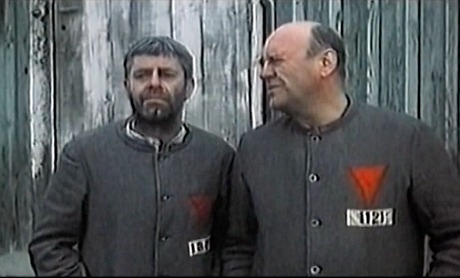
Venal and appalling as he’s shown himself to be on so many occasions, Donald Trump is not 100% wrong when he says that some in the U.S.-based Muslim community have been reluctant to report alarming activity and/or intentions. This suspicion is obviously backed up by reports that Omar Mateen‘s widow, Noor Salman, knew of his intention to cause harm (one report says she accompanied him when he bought firearms used in last weekend’s massacre) and tried to talk him out of this.
Federal prosecutors have reportedly convened a grand jury to investigate her and possibly charge her as an accessory to 49 counts of murder and 53 counts of attempted murder as well as with failure to notify law enforcement about the pending terrorist attack and lying to federal agents.
Posted on 3.23.16: “Trump’s broad-brush thinking and sloppy sentence construction implies that many if not most Muslims may be guilty of looking the other way, which is an undoubtedly wrong and unwise conclusion, but there seems to be little doubt that a tiny sliver of persons within any average Muslim expat community support ISIS, and that these persons are almost certainly keeping quiet about what they may have seen or heard about the activities or whereabouts of the ‘wrong’ ones. It follows that friends and family of these persons would probably also keep mum.
Yesterday Indiewire‘s Anne Thompson posted a 2017 Best Picture projection piece. I’m here to straighten her out on a few things. I’ll post her list of preferred contenders with comments and corrections, and then post my own.
Thompson’s first wrongo is her statement that Nate Parker‘s The Birth of a Nation and Jeff Nichols‘ Loving have emerged as “the biggest Oscar contenders for Best Picture.” The wildly euphoric response to Parker’s film during last January’s Sundance Film Festival is still having its effect. I’m not saying Birth won’t be Best Picture nominated, but it won’t stand up to the second and third waves of scrutiny that will kick in after it screens at the fall festivals and especially after Joe and Jane Popcorn start paying to see it. Loving is a decent film but not a great one. The Oscar pony isn’t the film but Ruth Negga‘s lead performance.
Thompson undervalues Kenneth Lonergan’s “emotionally devastating” Manchester By the Sea (Roadside/Amazon) by ranking it third. As a portrait of human tragedy and vulnerability it is two or three times better than Loving and The Birth of a Nation combined. Lonergan’s writing alone makes it a huge stand-out. And there’s are no performances in Loving (including Negga’s) or The Birth of a Nation that can hold a candle to Casey Affleck‘s turn as a devastated lonely-guy divorcee.
Thompson’s leading Best Picture contenders following the above three:
4. Robert Zemeckis‘ Allied (Paramount). Wells comment: Does Zemeckis make Best Picture contenders any more? Brad Pitt and Marion Cotillard, WWII espionage and assassination, etc. Feels more “commercial” than anything else.
5. Ang Lee‘s Billy Lynn’s Long Halftime Walk (Sony). Wells comment: Probably.
6. Denzel Washington‘s Fences (Paramount). Wells comment: Probably.
7. Gary Ross‘s The Free State of Jones (STX). Wells comment: Not a chance. They’ve been hiding it. Ross clearly doesn’t “do” Oscar-level stuff.
8. Derek Cianfrance‘s The Light Between Oceans (DreamWorks/Disney). Wells comment: No way. It’s opening commercially on 9.2 — the day that Telluride kicks off. If it had the vaguest Oscar qualifying chops it would be playing at Telluride and opening later.
9. Morten Tyldum‘s Passengers (Sony). Wells comment: Strictly a big-budget commercial space drama. Not a prayer of Oscar contention except for production design, FX, etc. The plot has an ethical problem that will stir a fair amount of debate once it opens commercially.
10. Warren Beatty‘s Rules Don’t Apply (New Regency/Fox). Wells comment: No clue at all but Beatty having described it as a “lighthearted dramedy” doesn’t exactly suggest an awards contender to me. It might be a perfectly fine film. I know it has a good story.
11. Martin Scorsese‘s Silence (Paramount). Wells comment: I’ve been hearing for months it’s going to be a rough sit in terms of physical anguish and torture scenes. Are we talking about the new Revenant?
12. Clint Eastwood‘s Sully (Warner Bros.). Wells comment: Maybe but after Tom Hanks lands his jet on the Hudson where can the movie go?
Suicide Squad‘s put-on attitude is obvious to the dumbest ticket-buyers in Beijing, Shanghai or Bangkok, but I’m getting a demonic vibe from this trailer. Something feral and soul-less. Maybe it has something to do with the Orlando massacre vibe but I’m suddenly asking myself “are there any depths that corporate Hollywood won’t sink to to make a sick buck?” What will this movie bring to the table except a razzle-dazzle porno-violent milkshake with a wink-wink attitude? How will this film not inject corporate poison into the veins of the culture? How will it expand our movie vocabulary or give anyone a sense of elevation? It seems 110% aimed at the lowest common denominator. Is director-writer David Ayer a closet Satanist? I’m sensing nausea here.
Did you know that prior to being condemned by Messala (Toby Kebbell) to life as an oar slave on a Roman ship that Judah Ben-Hur (Jack Huston) travelled to Nazareth and had a philosophical conversation with a brawny, bearded carpenter of Brazilian ancestry (Rodrigo Santoro)? Carpenter: “Love your enemies. God is love. He has a path for you.” JBH: “If he’s already decided my path how am I better off [something or other]?” Carpenter: “Why don’t you ask God?”
Wiki tipoff: “Unlike in the original film, Jesus H. Christ will have a prominent role in this version. Paramount Pictures’ vice chairman Rob Moore [has] stated that Christ in this version “is going to be consistent with people’s expectations,” and that the “expectations of the faithful will be honored by this one.” This was because Paramount wants to avoid the sort of backlash received by Darren Aronofsky‘s Noah because some Christians were dismayed by the film’s inventive and inaccurate interpretation of the Bible.”
What is that Godawful song playing over portions of this?
The trailer obviously makes clear that Jack Hawkins‘ Quintus Arrius character has been eliminated from the upcoming version, which Paramount will release on 8.19.